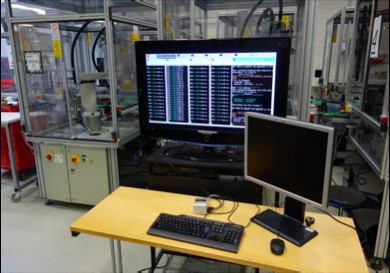- Published on 10 Mar 2016
- Project News
eScop at and beyond the finish line
eScop (Embedded systems Service-based Control for Open manufacturing and Process automation) is a three-year ARTEMIS/ECSEL project which ran from March 2013 to February 2016. During the project ten European partners from academia and industry in four countries came together to create an open, knowledge-driven manufacturing execution system (OKD-MES). The project has summarised its results in the following video:
During the project it was possible to create the right atmosphere that enabled a shift from traditional work package-oriented mindset to the joint development of different key elements for OKD-MES. The result is that now, an OKD-MES can be evaluated and built by using the tools and downloading the components available at http://www.escop-project.eu/tools/
These tools include simulators of three systems that were used as use cases in the project to validate the OKD-MES approach: INCAS, a supply chain automation company of warehouse equipment, the FASTory production line for electronics production, and an oil lubrication system by Fluidhouse Oy, a fluid automation solutions expert. The simulators allow the eScop OKD-MES approach to be tested and one’s own solutions to be benchmarked against the service-based control and monitoring of different industrial systems. Once the FASTory simulator got up and running , within one month it got more than five thousands service invocations from all around the world. As it is also being used for educational purposes, the next generation of engineers will get a chance to master relevant technologies for a service-oriented, knowledge-driven approach.
Use of web services allows the fast and easy assembly of complex solutions. The following video demonstrates the work of the production line controlled by a Raspberry PI, a device that costs just a few tens of euros.

Raspberry PI (small grey box between
keyboard and the screen) hosts the orchestrator
and testers for the FASTory line. It is probably
the cheapest device seen in the photo.
The tools and components are supported by training material accessible at the eScop Training Centre, which also contains set of presentations and videos explaining how to install and use the findings of the project: http://www.escop-project.eu/training
Some of the components can be purchased from the corresponding organisation’s project partners while others are accessible as an open source and available at GitHub.
Technology director of Fluidhouse Oy, Mr. Otto Karhumäki, has commented on the results of the project as follows: “We have started to use OKD-MES in our company, which allowed us to create a powerful production management tool. We have got better awareness about the situation on the production floor and are therefore able to take better decisions. From the technology point of view, the use of well-known concepts and tools (e.g. links and browser) and browser-friendly standards enables anyone to use the system.” Those ideas are shared by Giuseppe Lucisano, project coordinator at SCM Group, who explained, “Use of the knowledge-driven approach allowed us to get the information on key performance indicators (KPIs), which were stored in the ontology, and it was and is very easy to retrieve using dedicated SPARQL query language.” Maurizio Foglia Taverna, CTO (Chief Technical Officer (R&D) at INCAS group said, “INCAS has performed quantitative tests to evaluate applied eScop technologies. We have found that we can have more than 10% savings, when upgrading software and hardware to the eScop solution, including the installation of eScop RTUs, and upgrading software and hardware. In our benchmarking we used two systems running in parallel - the conventional one and the eScop solution to make the assessment.”
At the end of the project, the project partners established the open Knowledge-driven Service-oriented System architectures and APIs (KiSS) W3C community group. The group has a general focus on knowledge-driven and service-oriented solutions. The consortium members aim to use this channel to share their vision and experience gained in the eScop project and also learn from others.


